A Facility Serving the Community & Beyond: World Vets Latin America Veterinary Training Center
World Vets has been operating veterinary field service projects in Latin America since 2008. During our time working in this region of the world, we experienced that many local veterinarians and veterinary students with whom we worked had received minimal, if any, surgical instruction and in turn did not perform sterilizations. Meanwhile dog and cat populations ran rampant as the local capacity to de-sex animals, and thus humanely control their reproduction, was limited to non-existent.
To address the gap in veterinary surgical skill, in addition to animal population control efforts, World Vets founded the Latin America Veterinary Training Center (LATC) in 2011. The main objective, and cornerstone of the center, is to provide free surgical instruction and training to Latin American veterinarians and upper level veterinary students. As such, it is our aim to equip trainee participants with the necessary skills and competence they can in turn use to benefit the animals in their own communities. The center also prides itself on teaching as well as practicing high quality veterinary care. Subsequently, the facility is equipped with modern equipment such as central oxygen, pulse oximeters and fluid pumps, as well as an autoclave, ultrasound and microscope.
The LATC is located in Nicaragua and since its inception has established relations with all the veterinary schools in the country. It has even received acknowledgements from such institutions regarding the invaluable skills our training has provided its students. The LATC training program has also developed to the point where weekly sessions are offered year round and we host participants from many Latin American countries such as Mexico, Guatemala and Paraguay. We have also incorporated an ongoing internship program, which allows those selected to obtain greater clinical experience and mentorship.
Furthermore, as a result of the activities at the LATC, World Vets is able to provide thousands of free sterilizations and health treatments every year for local animals in Nicaragua. We operate daily pick ups/drop offs for animals living in outlying rural communities, which make spay/neuter and other needed veterinary services accessible for those who otherwise could not afford it. We even operate outreach clinics in other nearby areas benefiting animals, due to distance, do not have access to the LATC or our pick up/drop off service.
Often times we also encounter unique or emergency cases that require immediate attention. One such animal was Pinta. She had an old wound that had been growing and growing on her left hind leg. Her owners were very concerned but admitted they were not able to afford the transport into the city and the associated veterinary costs. Although challenging to the size of the wound, our LATC team was able to clean the wound of old tissue and close it enough to allow it to heal. After three weeks in our care, Pinta is almost healed and ready to go back to her family! Unfortunately without care, Pinta was unlikely to survive the infection. As Pinta’s case highlights, many local animals benefit greatly from the free services provided at the LATC, not only from spay/neuter but life saving veterinary interventions.
- Pinta recovery
- Pinta after surgery
- Pinta recovery
In short, the LATC greatly benefits its immediate community and beyond through the training and mentorship provided to its trainee participants. What’s more, it also provides essential veterinary services for local animals and rural communities who otherwise may never have access to quality veterinary care. If you support capacity building of future and present veterinary professionals, and if you believe that all animals deserve access to skilled veterinary care, we encourage you to support our Latin America Veterinary Training Center! We also accept corporate sponsorships and welcome other partnership opportunities.




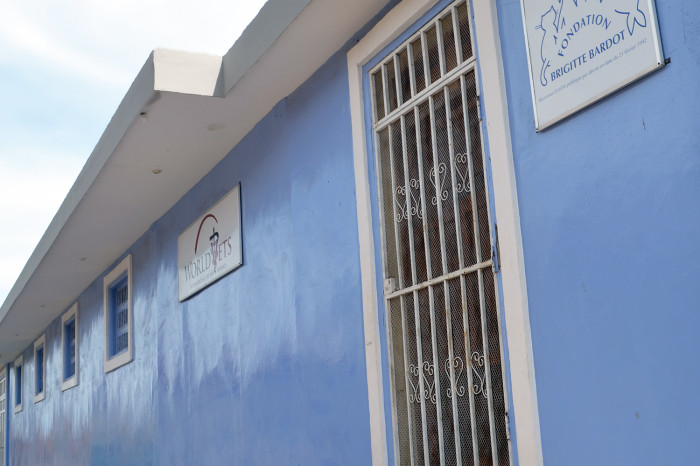
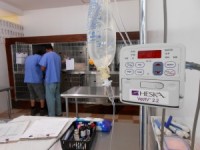
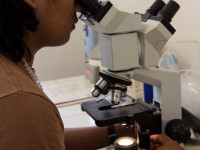
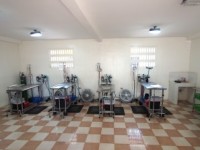
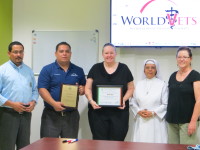
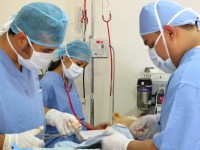
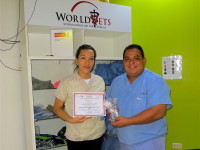
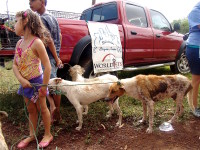
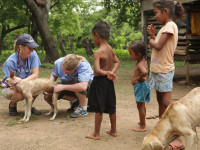
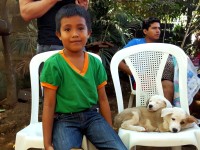
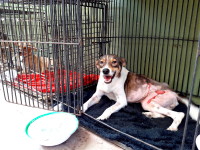
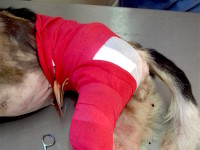
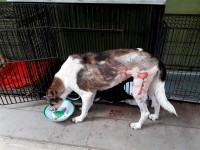

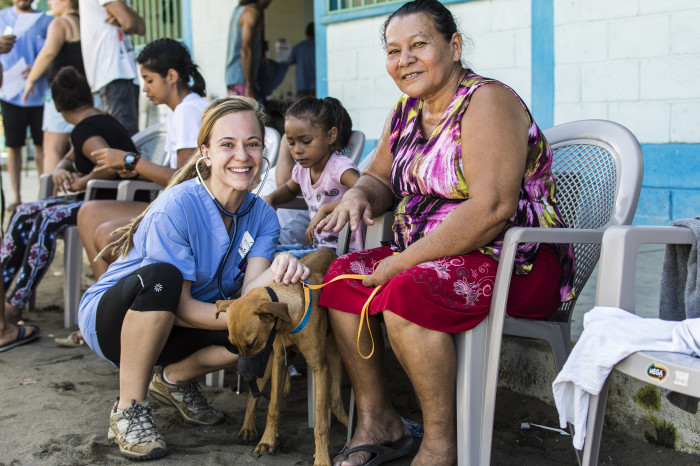
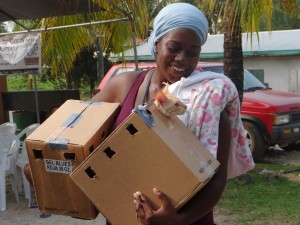 Punta Gorda, often referred to as the “end of the world” by local inhabitants was the most recent location to benefit from World Vets assistance. As implied by its nickname, Punta Gorda, the southern most town in the country of Belize, very much feels disconnected, forgotten and lived a part from the rest of the country.
Punta Gorda, often referred to as the “end of the world” by local inhabitants was the most recent location to benefit from World Vets assistance. As implied by its nickname, Punta Gorda, the southern most town in the country of Belize, very much feels disconnected, forgotten and lived a part from the rest of the country.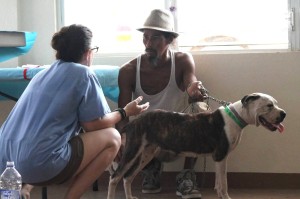 experiencing an exponential growth in the small animal population, in addition to the number of roaming and feral animals.
experiencing an exponential growth in the small animal population, in addition to the number of roaming and feral animals.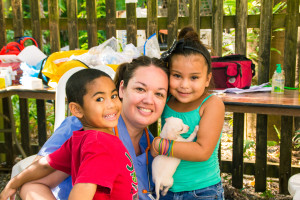 Roatan is the largest of the Bay Islands located off the coast of Honduras in the Caribbean. Even though it may be the largest island of the archipelago, there is still more to be desired in relation to the health services provided for the small animal population. This is in part due to the limited number of practicing veterinarians on the island as well as the local population’s inability to pay for veterinary services.
Roatan is the largest of the Bay Islands located off the coast of Honduras in the Caribbean. Even though it may be the largest island of the archipelago, there is still more to be desired in relation to the health services provided for the small animal population. This is in part due to the limited number of practicing veterinarians on the island as well as the local population’s inability to pay for veterinary services.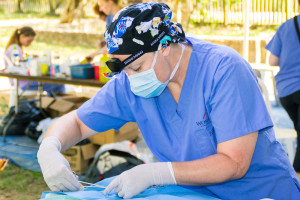 been sending veterinary teams to Roatan since 2008. Our teams not only provide much needed spay/neuter services to help control the small animal population, they also provide medical consultations, in addition to treatments for common skin issues, parasites and more.
been sending veterinary teams to Roatan since 2008. Our teams not only provide much needed spay/neuter services to help control the small animal population, they also provide medical consultations, in addition to treatments for common skin issues, parasites and more.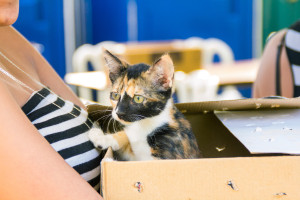 2000 animals have received quality veterinary care. All of which also contributes to the improvement of the overall animal and human health on the island.
2000 animals have received quality veterinary care. All of which also contributes to the improvement of the overall animal and human health on the island.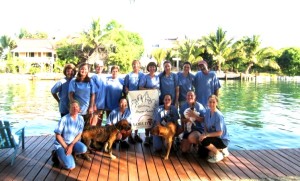 We have just had a team return from a successful pilot project executed in Placencia, Belize. Not only was this the first veterinary team we’ve sent to this area it was also the first direct veterinary service campaign for the community they served. As such our team was able to help many animals in need performing free sterilization surgeries as well as health consultations and treatments. We’d like to thank our local partners as well as World Vets volunteers for an outstanding effort.
We have just had a team return from a successful pilot project executed in Placencia, Belize. Not only was this the first veterinary team we’ve sent to this area it was also the first direct veterinary service campaign for the community they served. As such our team was able to help many animals in need performing free sterilization surgeries as well as health consultations and treatments. We’d like to thank our local partners as well as World Vets volunteers for an outstanding effort. 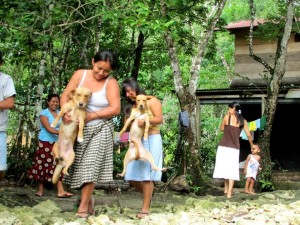 A World Vets team has just returned after a great adventure to the Atlantic Coast of Guatemala. Following 7 hours of travel, in a van and boat ride from the capital, they arrived in the Livingston/Rio Dulce region. During their visit they provided free veterinary services, a luxury for local cats and dogs, as local services for animals are hard to come by in such an isolated area. Many communities are only accessible by boat making veterinary care a great challenge.
A World Vets team has just returned after a great adventure to the Atlantic Coast of Guatemala. Following 7 hours of travel, in a van and boat ride from the capital, they arrived in the Livingston/Rio Dulce region. During their visit they provided free veterinary services, a luxury for local cats and dogs, as local services for animals are hard to come by in such an isolated area. Many communities are only accessible by boat making veterinary care a great challenge.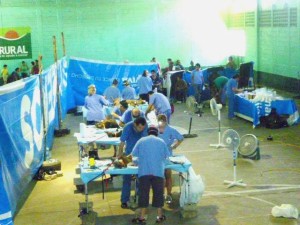 performed as well as an additional 200 plus health consultations and treatments provided to local animals. We also saw patients at the dock of our accommodations during the evening along the river. In these activities, we were joined by local volunteers and veterinary students from Universidad de San Carlos de Guatemala.
performed as well as an additional 200 plus health consultations and treatments provided to local animals. We also saw patients at the dock of our accommodations during the evening along the river. In these activities, we were joined by local volunteers and veterinary students from Universidad de San Carlos de Guatemala.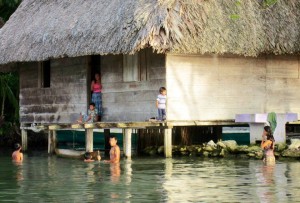 local Centro de Salud and municipality of Livingston for all their support in helping make this campaign possible. And finally we would like to thank local businesses and the community of Livingston for their warm welcome and hospitality.
local Centro de Salud and municipality of Livingston for all their support in helping make this campaign possible. And finally we would like to thank local businesses and the community of Livingston for their warm welcome and hospitality.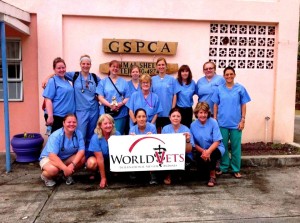 In April World Vets sent an all female volunteer veterinary team to St. George’s, Grenada. There they worked in collaboration with the Grenada SPCA as well as students from St. George’s University. Together we provided a large scale spay/neuter and animal health campaign which resulted in animals from all over the island benefiting from our free services. We’d like to thank World Vets veterinary volunteers as well as GSPCA and St. George’s University for all of their support in making our visit and campaign a reality.
In April World Vets sent an all female volunteer veterinary team to St. George’s, Grenada. There they worked in collaboration with the Grenada SPCA as well as students from St. George’s University. Together we provided a large scale spay/neuter and animal health campaign which resulted in animals from all over the island benefiting from our free services. We’d like to thank World Vets veterinary volunteers as well as GSPCA and St. George’s University for all of their support in making our visit and campaign a reality.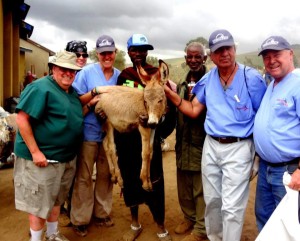 We have just completed a two week veterinary campaign in Arusha, Tanzania. During this campaign, our teams operated mobile donkey welfare clinics in multiple areas which resulted in close to 1000 donkeys receiving free veterinary services. Following donkey work, we also operated a vaccination campaign where 400 dogs were vaccinated for rabies.
We have just completed a two week veterinary campaign in Arusha, Tanzania. During this campaign, our teams operated mobile donkey welfare clinics in multiple areas which resulted in close to 1000 donkeys receiving free veterinary services. Following donkey work, we also operated a vaccination campaign where 400 dogs were vaccinated for rabies.